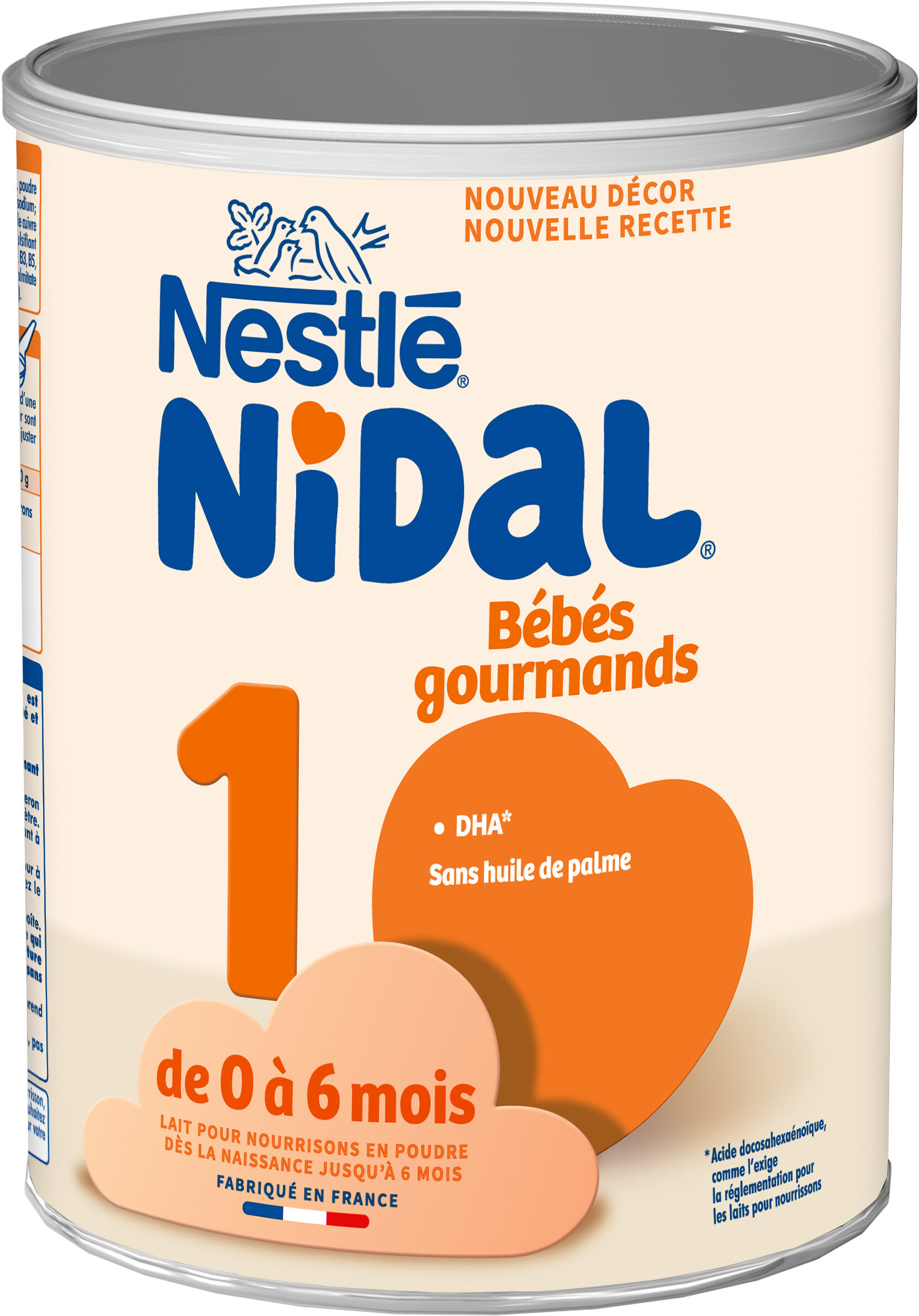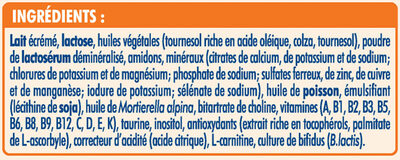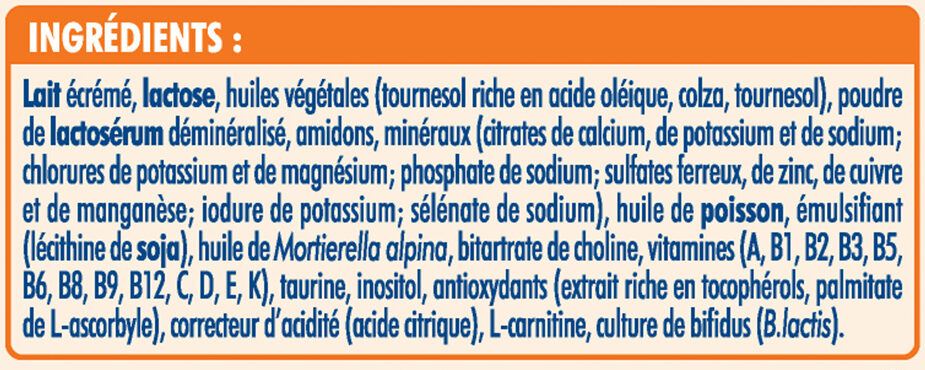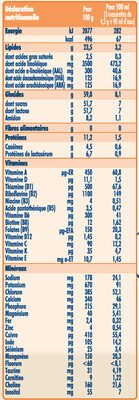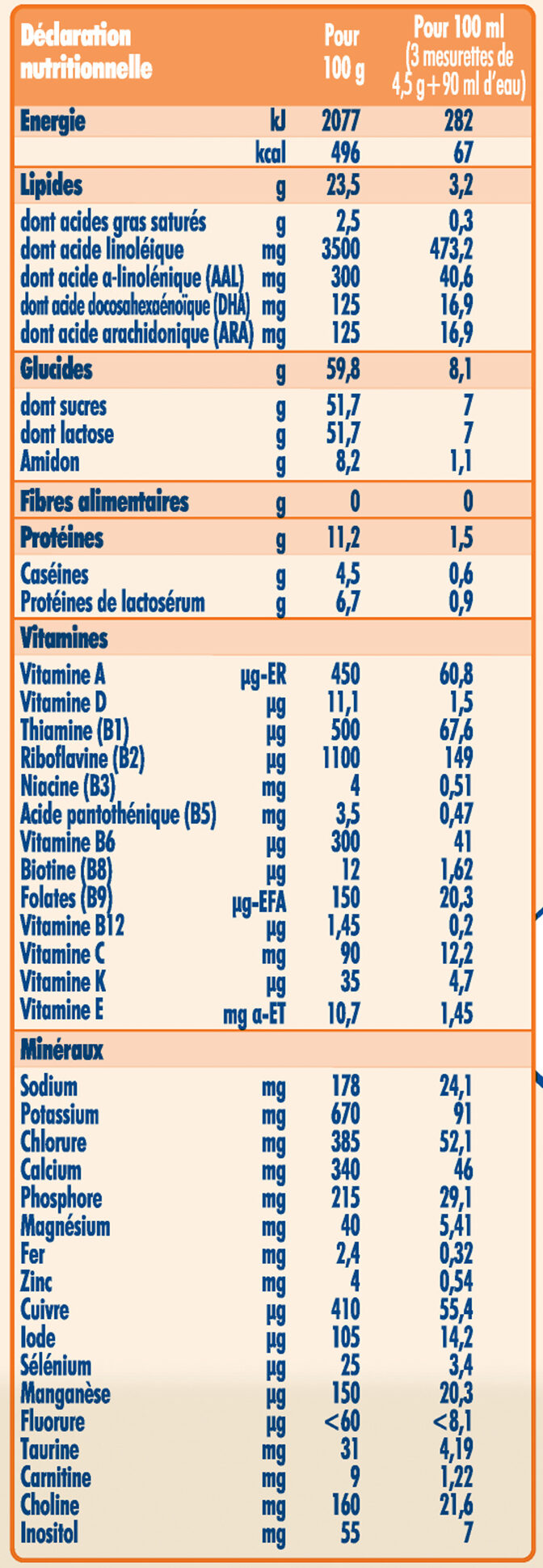Help us make food transparency the norm!
As a non-profit organization, we depend on your donations to continue informing consumers around the world about what they eat.
The food revolution starts with you!
Nidal bébé gourmand - Nestle - 800 g
Nidal bébé gourmand - Nestle - 800 g
Some of the data for this product has been provided directly by the manufacturer NESTLE FRANCE. - Customer service: Contact form 0 809 400 412 (service gratuit + prix de l'appel)
Barcode: 7613036677943 (EAN / EAN-13)
Common name: Lait pour nourrissons en poudre
Quantity: 800 g
Packaging: Box
Categories: Baby foods, Baby milks, Infant formulas, Ready to feed baby milks
Labels, certifications, awards:
Green Dot, Made in France, Triman

Origin of the product and/or its ingredients: FRANCE
Origin of ingredients: European Union
Manufacturing or processing places: France
Link to the product page on the official site of the producer: http://www.bebe.nestle.fr
Countries where sold: France
Matching with your preferences
Health
Ingredients
-
49 ingredients
: LAIT écrémé, LACTOSE, mélange d'huile de tournesol riche en acide oléique, d'huile de colza et d'huile de tournesol, poudre de LACTOSERUM déminéralisé, amidons, minéraux (citrates de calcium, de potassium et de sodium ; chlorures de potassium et de magnésium ; phosphate de sodium ; sulfates ferreux, de zinc, de cuivre et de manganèse ; iodure de potassium ; sélénate de sodium), huile de POISSON, émulsifiant (lécithine de SOJA), huile de Mortierrella alpina, bitartrate de choline, vitamines (A, B1, B2, B3, B5, B6, B8, B9, B12, C, D, E, K), taurine, inositol, antioxydants (extrait riche en tocophérols, palmitate de L-ascorbyle), correcteur d'acidité (acide citrique), L-carnitine, culture de bifidus (B.lactis).Allergens: Fish, Milk, Soybeans
Food processing
-
Ultra processed foods
Elements that indicate the product is in the 4 - Ultra processed food and drink products group:
- Additive: E322 - Lecithins
- Ingredient: Emulsifier
- Ingredient: Lactose
- Ingredient: Whey
Food products are classified into 4 groups according to their degree of processing:
- Unprocessed or minimally processed foods
- Processed culinary ingredients
- Processed foods
- Ultra processed foods
The determination of the group is based on the category of the product and on the ingredients it contains.
Additives
-
E304 - Fatty acid esters of ascorbic acid
Ascorbyl palmitate: Ascorbyl palmitate is an ester formed from ascorbic acid and palmitic acid creating a fat-soluble form of vitamin C. In addition to its use as a source of vitamin C, it is also used as an antioxidant food additive -E number E304-. It is approved for use as a food additive in the EU, the U.S., Canada, Australia, and New Zealand.Ascorbyl palmitate is known to be broken down -through the digestive process- into ascorbic acid and palmitic acid -a saturated fatty acid- before being absorbed into the bloodstream. Ascorbyl palmitate is also marketed as "vitamin C ester".Source: Wikipedia
-
E304i - Ascorbyl palmitate
Ascorbyl palmitate: Ascorbyl palmitate is an ester formed from ascorbic acid and palmitic acid creating a fat-soluble form of vitamin C. In addition to its use as a source of vitamin C, it is also used as an antioxidant food additive -E number E304-. It is approved for use as a food additive in the EU, the U.S., Canada, Australia, and New Zealand.Ascorbyl palmitate is known to be broken down -through the digestive process- into ascorbic acid and palmitic acid -a saturated fatty acid- before being absorbed into the bloodstream. Ascorbyl palmitate is also marketed as "vitamin C ester".Source: Wikipedia
-
E322 - Lecithins
Lecithins are natural compounds commonly used in the food industry as emulsifiers and stabilizers.
Extracted from sources like soybeans and eggs, lecithins consist of phospholipids that enhance the mixing of oil and water, ensuring smooth textures in various products like chocolates, dressings, and baked goods.
They do not present any known health risks.
-
E322i - Lecithin
Lecithins are natural compounds commonly used in the food industry as emulsifiers and stabilizers.
Extracted from sources like soybeans and eggs, lecithins consist of phospholipids that enhance the mixing of oil and water, ensuring smooth textures in various products like chocolates, dressings, and baked goods.
They do not present any known health risks.
-
E330 - Citric acid
Citric acid is a natural organic acid found in citrus fruits such as lemons, oranges, and limes.
It is widely used in the food industry as a flavor enhancer, acidulant, and preservative due to its tart and refreshing taste.
Citric acid is safe for consumption when used in moderation and is considered a generally recognized as safe (GRAS) food additive by regulatory agencies worldwide.
Ingredients analysis
-
May contain palm oil
Ingredients that may contain palm oil: E304i
-
Non-vegan
Non-vegan ingredients: Skimmed milk, Lactose, Demineralised whey, Fish oil, L-carnitineSome ingredients could not be recognized.
We need your help!
You can help us recognize more ingredients and better analyze the list of ingredients for this product and others:
- Edit this product page to correct spelling mistakes in the ingredients list, and/or to remove ingredients in other languages and sentences that are not related to the ingredients.
- Add new entries, synonyms or translations to our multilingual lists of ingredients, ingredient processing methods, and labels.
If you would like to help, join the #ingredients channel on our Slack discussion space and/or learn about ingredients analysis on our wiki. Thank you!
-
Non-vegetarian
Non-vegetarian ingredients: Fish oilSome ingredients could not be recognized.
We need your help!
You can help us recognize more ingredients and better analyze the list of ingredients for this product and others:
- Edit this product page to correct spelling mistakes in the ingredients list, and/or to remove ingredients in other languages and sentences that are not related to the ingredients.
- Add new entries, synonyms or translations to our multilingual lists of ingredients, ingredient processing methods, and labels.
If you would like to help, join the #ingredients channel on our Slack discussion space and/or learn about ingredients analysis on our wiki. Thank you!
-
Details of the analysis of the ingredients
We need your help!
Some ingredients could not be recognized.
We need your help!
You can help us recognize more ingredients and better analyze the list of ingredients for this product and others:
- Edit this product page to correct spelling mistakes in the ingredients list, and/or to remove ingredients in other languages and sentences that are not related to the ingredients.
- Add new entries, synonyms or translations to our multilingual lists of ingredients, ingredient processing methods, and labels.
If you would like to help, join the #ingredients channel on our Slack discussion space and/or learn about ingredients analysis on our wiki. Thank you!
: LAIT écrémé, LACTOSE, mélange d'huile de tournesol riche en acide oléique, d'huile de colza, d'huile de tournesol, LACTOSERUM déminéralisé, amidons, minéraux (citrates de calcium, citrates de potassium, citrates de sodium, chlorures de potassium, chlorures de magnésium, phosphate de sodium, sulfates ferreux, de zinc, de cuivre, de manganèse, iodure de potassium, sélénate de sodium), huile de POISSON, émulsifiant (lécithine de SOJA), huile de Mortierrella alpina, bitartrate de choline, vitamines, vitamine A, vitamine B1, vitamine B2, vitamine B3, vitamine B5, vitamine B6, vitamine B8, vitamine B9, vitamine B12, vitamine C, vitamine D, vitamine E, vitamine K, taurine, inositol, antioxydants (extrait riche en tocophérols, palmitate de L-ascorbyle), correcteur d'acidité (acide citrique), L-carnitine, culture de bifidus (bifidobacterium lactis)- LAIT écrémé -> en:skimmed-milk - vegan: no - vegetarian: yes - ciqual_proxy_food_code: 19051 - percent_min: 3.125 - percent_max: 100
- LACTOSE -> en:lactose - vegan: no - vegetarian: yes - percent_min: 0 - percent_max: 50
- mélange d'huile de tournesol riche en acide oléique -> fr:melange-d-huile-de-tournesol-riche-en-acide-oleique - percent_min: 0 - percent_max: 33.3333333333333
- d'huile de colza -> en:colza-oil - vegan: yes - vegetarian: yes - from_palm_oil: no - ciqual_food_code: 17130 - percent_min: 0 - percent_max: 25
- d'huile de tournesol -> en:sunflower-oil - vegan: yes - vegetarian: yes - from_palm_oil: no - ciqual_food_code: 17440 - percent_min: 0 - percent_max: 20
- LACTOSERUM déminéralisé -> en:demineralised-whey - vegan: no - vegetarian: maybe - percent_min: 0 - percent_max: 16.6666666666667
- amidons -> en:starch - vegan: yes - vegetarian: yes - ciqual_proxy_food_code: 9510 - percent_min: 0 - percent_max: 14.2857142857143
- minéraux -> en:minerals - percent_min: 0 - percent_max: 12.5
- citrates de calcium -> en:e333 - vegan: yes - vegetarian: yes - percent_min: 0 - percent_max: 12.5
- citrates de potassium -> en:e332 - vegan: yes - vegetarian: yes - percent_min: 0 - percent_max: 6.25
- citrates de sodium -> en:e331 - vegan: yes - vegetarian: yes - percent_min: 0 - percent_max: 4.16666666666667
- chlorures de potassium -> en:e508 - vegan: yes - vegetarian: yes - percent_min: 0 - percent_max: 3.125
- chlorures de magnésium -> en:e511 - vegan: yes - vegetarian: yes - percent_min: 0 - percent_max: 2.5
- phosphate de sodium -> en:e339 - vegan: yes - vegetarian: yes - percent_min: 0 - percent_max: 2.08333333333333
- sulfates ferreux -> en:ferrous-sulfate - percent_min: 0 - percent_max: 1.78571428571429
- de zinc -> en:zinc - percent_min: 0 - percent_max: 1.5625
- de cuivre -> en:copper - percent_min: 0 - percent_max: 1.38888888888889
- de manganèse -> en:manganese - percent_min: 0 - percent_max: 1.25
- iodure de potassium -> en:potassium-iodide - vegan: yes - vegetarian: yes - ciqual_food_code: 11058 - percent_min: 0 - percent_max: 0.375
- sélénate de sodium -> en:sodium-selenate - percent_min: 0 - percent_max: 0.375
- huile de POISSON -> en:fish-oil - vegan: no - vegetarian: no - from_palm_oil: no - percent_min: 0 - percent_max: 11.1111111111111
- émulsifiant -> en:emulsifier - percent_min: 0 - percent_max: 10
- lécithine de SOJA -> en:soya-lecithin - vegan: yes - vegetarian: yes - ciqual_food_code: 42200 - percent_min: 0 - percent_max: 10
- huile de Mortierrella alpina -> fr:huile-de-mortierrella-alpina - percent_min: 0 - percent_max: 9.09090909090909
- bitartrate de choline -> en:choline-bitartrate - vegan: maybe - vegetarian: maybe - percent_min: 0 - percent_max: 8.33333333333333
- vitamines -> en:vitamins - vegan: yes - vegetarian: yes - percent_min: 0 - percent_max: 7.69230769230769
- vitamine A -> en:vitamin-a - vegan: yes - vegetarian: yes - percent_min: 0 - percent_max: 7.14285714285714
- vitamine B1 -> en:thiamin - percent_min: 0 - percent_max: 6.66666666666667
- vitamine B2 -> en:e101 - vegan: maybe - vegetarian: yes - percent_min: 0 - percent_max: 6.25
- vitamine B3 -> en:e375 - vegan: maybe - vegetarian: maybe - percent_min: 0 - percent_max: 5.88235294117647
- vitamine B5 -> en:pantothenic-acid - vegan: yes - vegetarian: yes - percent_min: 0 - percent_max: 5.55555555555556
- vitamine B6 -> en:vitamin-b6 - vegan: yes - vegetarian: yes - percent_min: 0 - percent_max: 5.26315789473684
- vitamine B8 -> en:vitamin-b8 - vegan: yes - vegetarian: yes - percent_min: 0 - percent_max: 5
- vitamine B9 -> en:folic-acid - percent_min: 0 - percent_max: 4.76190476190476
- vitamine B12 -> en:vitamin-b12 - percent_min: 0 - percent_max: 4.54545454545455
- vitamine C -> en:e300 - vegan: yes - vegetarian: yes - percent_min: 0 - percent_max: 4.34782608695652
- vitamine D -> en:vitamin-d - percent_min: 0 - percent_max: 4.16666666666667
- vitamine E -> en:vitamin-e - percent_min: 0 - percent_max: 4
- vitamine K -> en:vitamin-k - vegan: yes - vegetarian: yes - percent_min: 0 - percent_max: 3.84615384615385
- taurine -> en:taurine - vegan: maybe - vegetarian: maybe - percent_min: 0 - percent_max: 3.7037037037037
- inositol -> en:inositol - vegan: yes - vegetarian: yes - percent_min: 0 - percent_max: 3.57142857142857
- antioxydants -> en:antioxidant - percent_min: 0 - percent_max: 3.44827586206897
- extrait riche en tocophérols -> en:e306 - vegan: yes - vegetarian: yes - percent_min: 0 - percent_max: 3.44827586206897
- palmitate de L-ascorbyle -> en:e304i - vegan: yes - vegetarian: yes - from_palm_oil: maybe - percent_min: 0 - percent_max: 1.72413793103448
- correcteur d'acidité -> en:acidity-regulator - percent_min: 0 - percent_max: 3.33333333333333
- acide citrique -> en:e330 - vegan: yes - vegetarian: yes - percent_min: 0 - percent_max: 3.33333333333333
- L-carnitine -> en:l-carnitine - vegan: no - vegetarian: maybe - percent_min: 0 - percent_max: 3.2258064516129
- culture de bifidus -> en:bifidus - vegan: maybe - vegetarian: yes - percent_min: 0 - percent_max: 3.125
- bifidobacterium lactis -> en:bifidobacterium-lactis - vegan: maybe - vegetarian: yes - percent_min: 0 - percent_max: 3.125
Nutrition
-
Nutri-Score not-applicable
Not-applicable for the category: Baby foods
⚠ ️Nutri-Score not applicable for this product category.Could you add the information needed to compute the Nutri-Score?
-
Nutrition facts
Nutrition facts As sold
for 100 g / 100 mlPrepared
for 100 g / 100 mlPrepared
per serving (103.5 g (100 ml (3 mesurettes de 4,5 g +90 ml d'eau)))Compared to: Ready to feed baby milks Energy 2,146 kj
(513 kcal)2,077 kj
(496 kcal)93.5 kj
(22 kcal)+206% Fat 25.7 g 23.5 g 1.06 g +247% Saturated fat 10 g 2.5 g 0.113 g +785% Alpha-linolenic acid 0.47 g ? ? Docosahexaenoic acid 0.057 g ? ? +32% Linoleic acid 3.9 g ? ? Arachidonic acid 0.057 g ? ? Carbohydrates 61 g 59.8 g 2.69 g +193% Sugars 53 g 51.7 g 2.33 g +317% Starch ? 8.2 g 0.369 g Fiber 0 g 0 g 0 g -100% Proteins 9.4 g 11.2 g 0.504 g +195% Casein 2.8 g ? ? Salt 0.375 g 445 g 20 g +130% Alcohol 0 % vol ? ? Vitamin A ? 450 µg 20.3 µg Vitamin D ? 11.1 µg 0.499 µg Vitamin E ? 10.7 mg 0.481 mg Vitamin K ? 35 µg 1.57 µg Vitamin C (ascorbic acid) ? 90 mg 4.05 mg Vitamin B1 (Thiamin) ? 500 mg 22.5 mg Vitamin B2 (Riboflavin) ? 1,100 mg 49.5 mg Vitamin B3/PP (Niacin) ? 4 mg 0.18 mg Vitamin B6 (Pyridoxin) ? 300 mg 13.5 mg Vitamin B9 (Folic acid) ? 150 µg 6.75 µg Vitamin B12 (cobalamin) ? 1.45 µg 0.065 µg Biotin ? 12 µg 0.54 µg Vitamin B5 (Pantothenic acid) ? 3.5 mg 0.158 mg Potassium ? 670 mg 30.1 mg Chloride ? 385 mg 17.3 mg Calcium ? 340 mg 15.3 mg Phosphorus ? 215 mg 9.67 mg Iron ? 2.4 mg 0.108 mg Magnesium ? 40 mg 1.8 mg Zinc ? 4 mg 0.18 mg Copper ? 410 mg 18.5 mg Manganese ? 0.15 mg 0.007 mg Fluoride ? 60 mg 2.7 mg Selenium ? 25 µg 1.13 µg Iodine ? 105 µg 4.72 µg Taurine 0.036 g ? ? Fruits‚ vegetables‚ nuts and rapeseed‚ walnut and olive oils (estimate from ingredients list analysis) 6.055 % ? ?
Environment
-
Eco-Score B - Low environmental impact
⚠ ️Select a country in order to include the full impact of transportation.The Eco-Score is an experimental score that summarizes the environmental impacts of food products.→ The Eco-Score was initially developped for France and it is being extended to other European countries. The Eco-Score formula is subject to change as it is regularly improved to make it more precise and better suited to each country.Life cycle analysis
-
Average impact of products of the same category: A (Score: 94/100)
Category: Baby milk, first milk, ready to feed
Category: Baby milk, first milk, ready to feed
- PEF environmental score: 0.15 (the lower the score, the lower the impact)
- including impact on climate change: 1.53 kg CO2 eq/kg of product
Stage Impact Agriculture
71.0 %Processing
1.0 %Packaging
9.6 %Transportation
10.7 %Distribution
6.0 %Consumption
1.7 %
Bonuses and maluses
-
Origins of ingredients with a high impact
Malus: -5
Environmental policy: -5
Transportation: 0
Origin of the product and/or its ingredients % of ingredients Impact European Union 100 %High
-
Packaging with a medium impact
Malus: -13
Shape Material Recycling Impact 1 Lid Plastic Discard High 1 Box Metal Recycle High 1 Seal Metal Recycle High ⚠ ️ The information about the packaging of this product is not sufficiently precise (exact shapes and materials of all components of the packaging).⚠ ️ For a more precise calculation of the Eco-Score, you can modify the product page and add them.
If you are the manufacturer of this product, you can send us the information with our free platform for producers.
Eco-Score for this product
-
Impact for this product: B (Score: 76/100)
Product: Nidal bébé gourmand - Nestle - 800 g
Life cycle analysis score: 94
Sum of bonuses and maluses: -18
Final score: 76/100
-
Carbon footprint
-
Equal to driving 0.8 km in a petrol car
153 g CO² per 100g of product
The carbon emission figure comes from ADEME's Agribalyse database, for the category: Baby milk, first milk, ready to feed (Source: ADEME Agribalyse Database)
Stage Impact Agriculture
73.4 %Processing
0.7 %Packaging
9.7 %Transportation
13.4 %Distribution
2.3 %Consumption
0.4 %
Packaging
-
Packaging with a medium impact
-
Packaging parts
1 x Box (Metal)
1 x Seal (Metal)
1 x Lid (Plastic)
-
Packaging materials
Material % Packaging weight Packaging weight per 100 g of product Plastic Metal Total
-
Transportation
-
Origins of ingredients
Origins of ingredients with a high impact
Origin of the product and/or its ingredients % of ingredients Impact European Union 100 %High
Other information
Preparation: Dosage à respecter impérativement : 1 mesurette arasée (4,5 g) dans 30 ml d'eau. Utilisez exclusivement la mesurette contenue dans cette boîte. Une quantité inappropriée de poudre peut conduire à la déshydratation ou priver votre enfant d'une nutrition adéquate. La fréquence des biberons et les quantités à préparer sont des indications moyennes. Le volume et le nombre de biberons sont à ajuster par les professionnels de santé aux besoins de chaque enfant. Jusqu'à 1 mois : 90 ml d'eau + 3 mesurettes, 1 à 2 mois : 120 ml d'eau + 4 mesurettes, 2 à 3 mois : 150 ml d'eau + 5 mesurettes, 3 à 4 mois : 180 ml d'eau + 6 mesurettes, 4 à 6 mois : 210 ml d'eau + 7 mesurettes. Préparez le biberon juste avant le repas. Utilisez une eau minérale ou une eau de source convenant aux nourrissons. Afin d'éviter la formation de grumeaux, reconstituez le biberon avec de l'eau tiède et préférez un biberon à large diamètre. Vous pouvez utiliser une tétine à débit variable convenant à une formule épaisse. Pour tiédir l'eau, nous vous déconseillons l'emploi du four à micro-ondes en raison du risque de brûlures. Préférez le bain-marie ou le chauffe-biberon. Jetez sans hésiter le reste d'un biberon non terminé.
Conservation conditions: Conserver la boîte bien fermée dans un endroit sec et frais, pas plus de 3 semaines après son ouverture.
Customer service: Nestlé France, 34-40 rue de Guynemer 92130 Issy-les-Moulineaux
Report a problem
-
Incomplete or incorrect information?
Category, labels, ingredients, allergens, nutritional information, photos etc.
If the information does not match the information on the packaging, please complete or correct it. Open Food Facts is a collaborative database, and every contribution is useful for all.
Data sources
The manufacturer NESTLE FRANCE uses Equadis to automatically transmit data and photos for its products.
Product added on by openfoodfacts-contributors
Last edit of product page on by org-nestle-france.
Product page also edited by ecoscore-impact-estimator, packbot.

